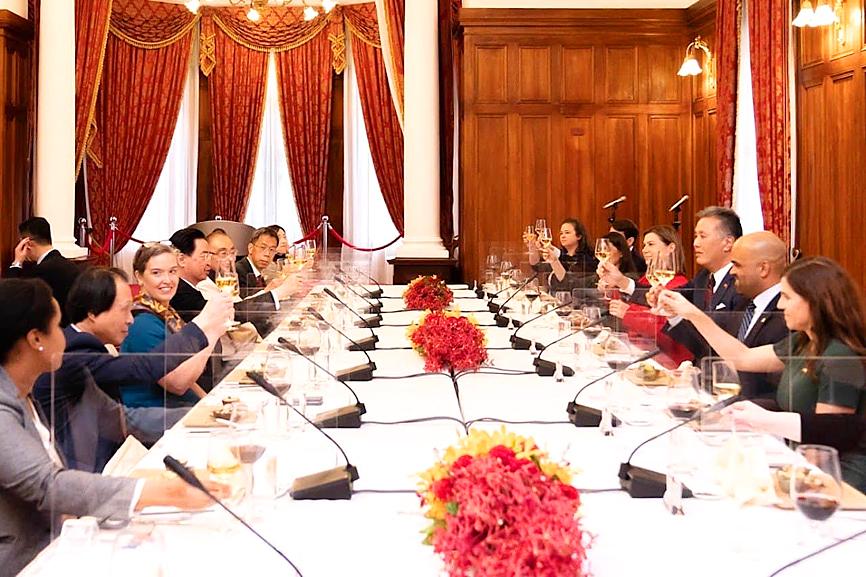US veterans could leverage their influence to push for broad-based cooperation with Taiwan, furthered by closer personal ties that would be fostered by a Veterans Affairs Council (VAC) mission soon to open in Washington, an analyst said.
While meeting a US congressional delegation in Taipei on Friday, President Tsai Ing-wen (蔡英文) announced that an official VAC mission would be established early next year.
The move is aimed at helping Taiwan “better coordinate and expand exchanges in health insurance, quality healthcare, employment assistance and long-term care for veterans,” Tsai said.

Photo courtesy of Ministry of Foreign Affairs
The council has in the past had limited interaction with senior US Department of Veterans Affairs officials, said Wong Ming-hsien (翁明賢), director of Tamkang University’s Graduate Institute of International Affairs and Strategic Studies.
However, civic veterans’ organizations in the US have long maintained close contact with Taiwan, even flying the Republic of China flag in some cases, Wong said in an interview on Saturday.
Since Tsai took office in 2016, three major US veterans’ groups — the American Legion, the Veterans of Foreign Wars and AMVETS — have sent representatives to Taiwan, he said.
In 2019, Tsai delivered a video address at the national convention of the American Legion, the largest veterans’ organization in the US, he added.
Lee Che-chuan (李哲全), a researcher at the Institute for National Defense and Security Research, agreed that the VAC mission would bolster interaction between Taiwan and the US.
It would also lead to more comprehensive exchanges in the manner of normal diplomatic relations, he added.
As it has a relatively low profile, the council could through its Washington mission assist from the sidelines in reforming the nation’s reserve forces, Lee said.
Veterans, in addition to active-duty personnel, play an important role in national defense, he said, adding that this is a crucial part of military exchanges with the US.
The VAC mission, paired with an invitation to attend next month’s Summit for Democracy, shows US commitment to upholding the 2018 Taiwan Travel Act, which allows for high-level visits between the two nations, Wong said.
Increased exchanges in the national security field also show that the US is not allowing China to influence its relations with Taiwan, he added.
The mission could facilitate visits by Taiwanese veterans to the US to meet their counterparts, indirectly boosting military cooperation by deepening personal relationships, Wong said.
US veterans also hold significant influence in the US Congress, and could potentially leverage this influence to push for closer relations between Taiwan and the US, he added.

POSITIVE DEVELOPMENT: Japan and the US are expected to hold in-depth discussions on Taiwan-related issues during the meeting next month, Japanese sources said The holding of a Japan-US leaders’ meeting ahead of US President Donald Trump’s visit to China is positive news for Taiwan, former Japan-Taiwan Exchange Association representative Hiroyasu Izumi said yesterday. After the Liberal Democratic Party’s landslide victory in Japan’s House of Representatives election, Japanese Prime Minister Sanae Takaichi is scheduled to visit the US next month, where she is to meet with Trump ahead of the US president’s planned visit to China from March 31 to April 2 for a meeting with Chinese President Xi Jinping (習近平). Japan and the US are expected to hold in-depth discussions on Taiwan-related issues during the

‘LIKE-MINDED PARTNER’: Tako van Popta said it would be inappropriate to delay signing the deal with Taiwan because of China, adding he would promote the issue Canadian senators have stressed Taiwan’s importance for international trade and expressed enthusiasm for ensuring the Taiwan-Canada trade cooperation framework agreement is implemented this year. Representative to Canada Harry Tseng (曾厚仁) in an interview with the Central News Agency (CNA) said he was increasingly uneasy about Ottawa’s delays in signing the agreement, especially as Ottawa has warmed toward Beijing. There are “no negotiations left. Not only [is it] initialed, we have three versions of the text ready: English, French and Mandarin,” Tseng said. “That tells you how close we are to the final signature.” Tseng said that he hoped Canadian Prime Minister Mark Carney

President William Lai (賴清德) yesterday bestowed one of Taiwan’s highest honors on Saint Vincent and the Grenadines (SVG) Ambassador Andrea Clare Bowman in recognition of her contributions to bilateral ties. “By conferring the Order of Brilliant Star with Grand Cordon on Ambassador Bowman today, I want to sincerely thank her, on behalf of the Taiwanese people, for her outstanding contribution to deepening diplomatic ties between Taiwan and SVG,” Lai said at a ceremony held at the Presidential Office in Taipei. He noted that Bowman became SVG’s first ambassador to Taiwan in 2019 and

A man walks past elementary school artworks at the Taipei Lantern Festival in Ximen District yesterday, the first day of the event. The festival is to run from 5pm to 10pm through March 15.